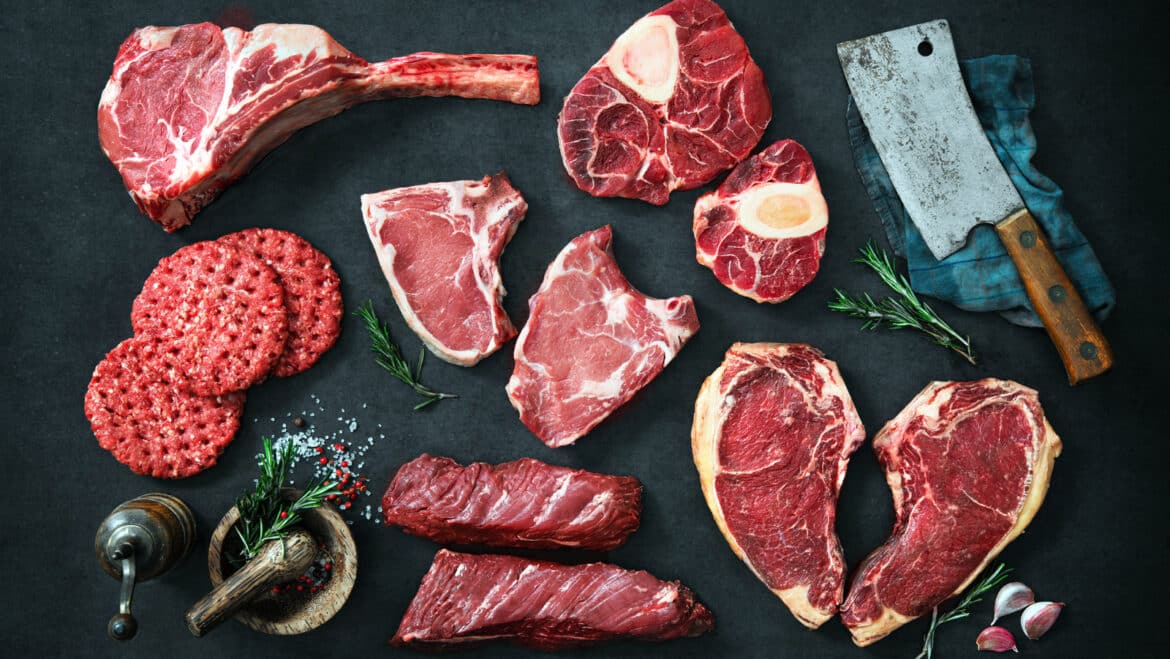Introduction
How Much Fat To Eat On Carnivore Diet: The carnivore diet is a dietary approach that emphasizes the consumption of animal products while excluding all plant-based foods. It is a highly controversial and debated diet that has gained popularity in recent years. Supporters of the carnivore diet claim that it can lead to weight loss, improved mental clarity, and increased energy levels. However, critics argue that it is an extreme and potentially unhealthy way of eating.
One of the key aspects of the carnivore diet is the high consumption of fat. Fat is an essential macronutrient that provides energy, supports hormone production, and aids in the absorption of fat-soluble vitamins. On the carnivore diet, fat is the primary source of calories, as carbohydrates are eliminated and protein intake is moderate. But how much fat should one consume on the carnivore diet?
There is no one-size-fits-all answer to this question, as individual needs and goals can vary. Some people on the carnivore diet may thrive on a higher fat intake, while others may prefer a more moderate approach. It is important to listen to your body and adjust your fat intake accordingly.
For those looking to lose weight on the carnivore diet, a higher fat intake may be beneficial. Fat is more satiating than carbohydrates, meaning it can help you feel fuller for longer and reduce cravings. Additionally, a higher fat intake can help your body enter a state of ketosis, where it burns fat for fuel instead of carbohydrates. This can lead to increased fat loss and improved body composition.

How many grams of fat should you eat on the carnivore diet?
The Optimal Amount of Fat on a Carnivore DietWhile there is no one-size-fits-all answer to how much fat you should consume on a carnivore diet, most people aim for a fat intake of 70-80% of their daily calories. This means that if you consume 2,000 calories per day, you should aim for 140-160 grams of fat.
The carnivore diet is a high-fat, low-carbohydrate diet that primarily consists of animal products. It is a popular diet among individuals who want to lose weight, improve their overall health, or follow a more natural and ancestral way of eating. However, one common question that arises when following the carnivore diet is how many grams of fat should be consumed.
On the carnivore diet, fat is the primary source of energy as carbohydrates are severely restricted. The exact amount of fat that should be consumed can vary depending on individual factors such as age, sex, weight, activity level, and overall health goals. However, a general guideline for fat intake on the carnivore diet is to consume around 70-80% of daily calories from fat.
This high-fat intake is necessary to ensure that the body has enough energy to function properly and to maintain a state of ketosis. Ketosis is a metabolic state in which the body uses fat as its primary fuel source instead of carbohydrates. By consuming a high amount of fat, the body is able to efficiently burn stored fat for energy, leading to weight loss and other health benefits.
It is important to note that not all fats are created equal. While the carnivore diet encourages the consumption of animal fats such as beef tallow, lard, and butter, it is also important to include a variety of fats from different sources. This includes monounsaturated fats found in foods like avocados and olive oil, as well as omega-3 fatty acids found in fatty fish like salmon and sardines.
Additionally, it is important to listen to your body and adjust your fat intake accordingly. Some individuals may find that they need to consume more fat to feel satiated and maintain their energy levels, while others may need to reduce their fat intake if they are not seeing the desired results. It is always best to consult with a healthcare professional or registered dietitian before making any significant changes to your diet.
Can you eat too much fat on carnivore diet?
However, red meat, high in saturated fat, is also allowed on the diet. Saturated fats can cause inflammation. Additionally, a high-protein diet (such as the carnivore diet) can be harmful to the kidneys—and can even promote gout and kidney stones.
On a carnivore diet, the primary source of nutrition comes from animal products, which are typically high in fat. This raises the question of whether it is possible to consume too much fat on this type of diet. While fat is an essential macronutrient that provides energy and supports various bodily functions, excessive consumption can have negative effects on health.
Firstly, it is important to note that the carnivore diet emphasizes the consumption of animal products, such as meat, fish, and eggs, while excluding all plant-based foods. These animal products naturally contain varying amounts of fat, depending on the specific type and cut. For example, fatty cuts of meat like ribeye steak or bacon are higher in fat compared to leaner options like chicken breast or fish fillets.
Secondly, fat is a dense source of calories, providing 9 calories per gram compared to 4 calories per gram from carbohydrates or protein. This means that consuming excessive amounts of fat can easily lead to a calorie surplus, which may contribute to weight gain and obesity. It is important to maintain a balance between calorie intake and expenditure to achieve and maintain a healthy weight.
Furthermore, consuming too much fat can also have negative effects on cardiovascular health. While the carnivore diet has been associated with improvements in certain cardiovascular risk factors, such as blood pressure and triglyceride levels, excessive intake of saturated and trans fats can increase the risk of heart disease. It is important to choose leaner cuts of meat and incorporate sources of healthy fats, such as fatty fish or avocado, to maintain a balanced intake.
Lastly, excessive fat consumption can also lead to digestive issues. Fat takes longer to digest compared to other macronutrients, and consuming large amounts can overwhelm the digestive system, leading to symptoms like bloating, diarrhea, or constipation. It is important to listen to your body and adjust your fat intake accordingly to avoid discomfort.
How do you eat enough fat on a carnivore diet?
Provided you have enough time to prepare the meat, you don’t need to worry about them being tougher or less enjoyable to eat, either. Regularly consuming fatty cuts of fish such as mackerel, salmon, trout, tuna, and sardines can help to increase not just dietary fat, but specific omega-3 fatty acids.
On a carnivore diet, the primary source of nutrition comes from animal products, which are naturally high in fat. However, it can still be a challenge for some individuals to consume enough fat to meet their dietary needs. Here are some strategies to ensure you eat enough fat on a carnivore diet.
1. Choose fatty cuts of meat: When selecting meat for your meals, opt for fattier cuts such as ribeye steak, pork belly, or chicken thighs with the skin on. These cuts tend to have a higher fat content, which can help you meet your fat intake goals.
2. Include organ meats: Organ meats like liver, kidney, and heart are not only rich in essential nutrients but also contain a good amount of fat. Incorporating these nutrient-dense foods into your diet can help increase your fat intake while providing a wide range of vitamins and minerals.
3. Cook with animal fats: Cooking your meals in animal fats like tallow, lard, or duck fat can significantly boost your fat consumption. These fats not only add flavor to your dishes but also provide a concentrated source of healthy fats.
4. Add butter or ghee: Butter and ghee are excellent sources of fat and can be easily incorporated into your meals. Whether you use them for cooking or as a topping, they can help increase your fat intake while adding a rich and creamy flavor to your dishes.
5. Include eggs: Eggs are a versatile and nutritious food that can be a great source of fat on a carnivore diet. They are high in healthy fats, particularly in the yolk, and can be enjoyed in various ways, such as scrambled, fried, or hard-boiled.
6. Consider adding dairy: While dairy is not strictly part of a carnivore diet, some individuals choose to include it. Full-fat dairy products like cheese, heavy cream, and yogurt can be consumed in moderation to increase your fat intake.
By incorporating these strategies into your carnivore diet, you can ensure that you are consuming enough fat to meet your nutritional needs. Remember to listen to your body and adjust your fat intake based on your individual requirements and goals.
Do you need high fat on a carnivore diet?
The carnivore diet, sometimes called the all-meat diet, focuses on consuming meat and animal products only. Being almost exclusively meat-only, this diet centers around high-protein, high-fat, and ideally zero-carb consumption. This means no fruits, vegetables, grains, or other plant-based foods.
What happens if I don’t eat enough fat on carnivore diet?
Cats and other carnivores that didn’t begin as fat-scavengers can get 70% of their energy from protein. Meeting your fat carnivore diet macro goals will protect you from protein poisoning. If you eat too much protein and not enough fat you will get protein poisoning.
The carnivore diet is a dietary approach that emphasizes the consumption of animal products while excluding all plant-based foods. It is a highly controversial and debated diet that has gained popularity in recent years. Supporters of the carnivore diet claim that it can lead to weight loss, improved mental clarity, and increased energy levels. However, critics argue that it is an extreme and potentially unhealthy way of eating.
One of the key aspects of the carnivore diet is the high consumption of fat. Fat is an essential macronutrient that provides energy, supports hormone production, and aids in the absorption of fat-soluble vitamins. On the carnivore diet, fat is the primary source of calories, as carbohydrates are eliminated and protein intake is moderate. But how much fat should one consume on the carnivore diet?
There is no one-size-fits-all answer to this question, as individual needs and goals can vary. Some people on the carnivore diet may thrive on a higher fat intake, while others may prefer a more moderate approach. It is important to listen to your body and adjust your fat intake accordingly.
For those looking to lose weight on the carnivore diet, a higher fat intake may be beneficial. Fat is more satiating than carbohydrates, meaning it can help you feel fuller for longer and reduce cravings. Additionally, a higher fat intake can help your body enter a state of ketosis, where it burns fat for fuel instead of carbohydrates. This can lead to increased fat loss and improved body composition.
The recommended daily intake of fat on a carnivore diet varies depending on individual needs and goals. However, a general guideline is to consume around 70-80% of your daily calories from fat. This high fat intake is essential for providing energy, supporting hormone production, and aiding in nutrient absorption.
It is important to note that not all fats are created equal. While saturated fats, such as those found in animal products, are a staple of the carnivore diet, it is also beneficial to include sources of monounsaturated and omega-3 fats. These can be found in foods like avocados, olive oil, and fatty fish.
Ultimately, the recommended daily intake of fat on a carnivore diet should be tailored to your individual needs and preferences. It is always best to consult with a healthcare professional or registered dietitian to determine the appropriate amount of fat for your specific goals and to ensure a well-rounded and balanced diet.
Are there any specific guidelines for consuming fat on a carnivore diet?
When following a carnivore diet, there are no specific guidelines for consuming fat. The primary focus of this diet is to consume animal-based foods, such as meat, fish, and eggs, while avoiding carbohydrates and plant-based foods. As a result, fat intake naturally increases as these animal-based foods are typically higher in fat content.
However, it is important to note that the quality of the fat consumed on a carnivore diet is crucial. Opting for healthy sources of fat, such as fatty cuts of meat, fatty fish, and eggs from pasture-raised animals, can provide essential nutrients and support overall health. It is also recommended to include a variety of animal-based foods to ensure a well-rounded nutrient intake.
How does the amount of fat consumed on a carnivore diet affect overall health?
The amount of fat consumed on a carnivore diet can have a significant impact on overall health. Fat is an essential macronutrient that provides energy, supports hormone production, and aids in the absorption of fat-soluble vitamins. On a carnivore diet, where carbohydrates are restricted, fat becomes the primary source of energy for the body.
Consuming an adequate amount of fat on a carnivore diet is crucial for maintaining optimal health. Fat provides a feeling of satiety, which can help control appetite and prevent overeating. It also plays a vital role in brain function and supports the health of cell membranes.
However, it is important to note that the quality of fat consumed on a carnivore diet is equally important as the quantity. Opting for healthy sources of fat, such as grass-fed beef, wild-caught fish, and pastured eggs, can provide essential nutrients like omega-3 fatty acids and conjugated linoleic acid (CLA), which have been linked to numerous health benefits.
Are there any potential risks or benefits associated with consuming too much fat on a carnivore diet?
Consuming too much fat on a carnivore diet can have both risks and benefits. On one hand, a high-fat intake can provide a quick and efficient source of energy, especially for those following a ketogenic version of the carnivore diet. Fat is also essential for the absorption of fat-soluble vitamins and the production of hormones.
However, consuming excessive amounts of fat can lead to weight gain and an increased risk of cardiovascular diseases. It is important to note that not all fats are created equal. While healthy fats like monounsaturated and polyunsaturated fats can have positive effects on heart health, excessive consumption of saturated and trans fats can have negative consequences.
Therefore, it is crucial to strike a balance and choose healthy sources of fat while following a carnivore diet. Incorporating fatty cuts of meat, eggs, fish, and avocados can provide the necessary fat intake without going overboard. It is also recommended to consult with a healthcare professional or registered dietitian to ensure that your fat intake aligns with your individual goals and preferences.
Can the amount of fat consumed on a carnivore diet be adjusted based on individual goals or preferences?
Yes, the amount of fat consumed on a carnivore diet can be adjusted based on individual goals or preferences. While the carnivore diet generally emphasizes a high intake of fat, the specific amount can vary depending on factors such as weight loss goals, activity level, and personal preferences.
For individuals looking to lose weight, reducing the amount of fat consumed may be beneficial as it can help create a calorie deficit. However, it is important to note that fat is a crucial macronutrient on the carnivore diet, providing energy and supporting various bodily functions. Therefore, it is essential to ensure that the reduction in fat intake is not excessive and still allows for adequate nutrient intake.
On the other hand, individuals who are more physically active or have higher energy needs may choose to increase their fat intake to meet their energy requirements. This can be particularly important for athletes or those engaging in intense physical activities, as fat serves as a valuable fuel source during prolonged exercise.

Conclusion
The carnivore diet is a high-fat, low-carbohydrate diet that primarily consists of animal products. It has gained popularity in recent years for its potential health benefits, including weight loss and improved blood sugar control. However, one common question that arises when following this diet is how much fat should be consumed.
While there is no one-size-fits-all answer to this question, it is generally recommended to consume a moderate to high amount of fat on the carnivore diet. This is because fat is the primary source of energy on this diet, as carbohydrates are severely restricted. Consuming an adequate amount of fat can help to keep you feeling full and satisfied, while also providing the necessary nutrients for optimal health.
When determining how much fat to eat on the carnivore diet, it is important to consider your individual goals and needs. If your primary goal is weight loss, you may want to consume a higher amount of fat to promote satiety and prevent overeating. On the other hand, if you are looking to maintain or gain weight, you may need to increase your fat intake even further.
It is also important to choose healthy sources of fat on the carnivore diet. While it may be tempting to consume large amounts of processed meats and fatty cuts of meat, it is important to prioritize quality over quantity. Opt for grass-fed and organic meats whenever possible, as they tend to be higher in beneficial nutrients and lower in harmful substances.
The amount of fat to eat on the carnivore diet can vary depending on individual goals and needs. It is generally recommended to consume a moderate to high amount of fat to support energy levels and overall health. However, it is important to choose healthy sources of fat and prioritize quality over quantity. Consulting with a healthcare professional or registered dietitian can also be helpful in determining the appropriate amount of fat for your specific needs.


1 comment
… [Trackback]
[…] Here you will find 16653 additional Information on that Topic: thefitnessblogger.com/how-much-fat-to-eat-on-carnivore-diet/ […]